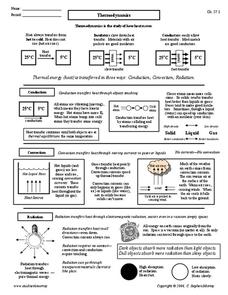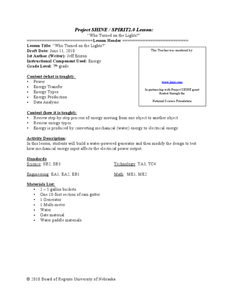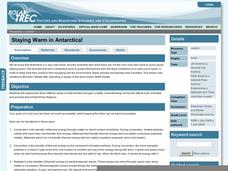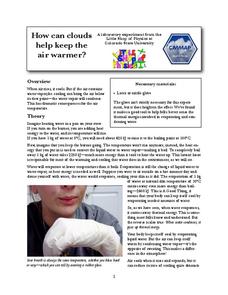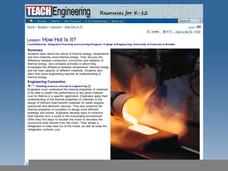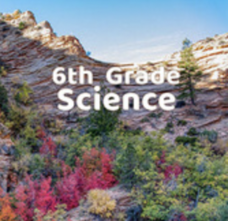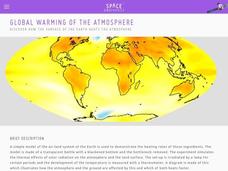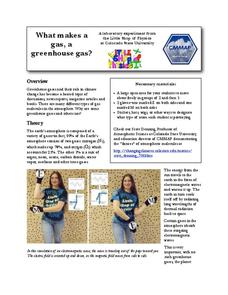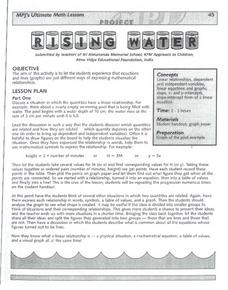Curated OER
Thermodynamics
In this thermodynamics worksheet, students learn about insulators and conductors. Students compare the three ways thermal energy is transferred: conduction, convection, and radiation. This worksheet has 22 matching, 1 multiple choice, 3...
Curated OER
Capturing the Sun's Warmth
Students explore the variety of ways to use solar energy. They investigate the thermal energy storage capacities of different test materials to determine which to use in passive solar building design. They explain how passive solar...
Curated OER
Who Turned on the Lights?
Seventh graders discuss how energy is transformed from one form to another. In this physics instructional activity, 7th graders design and build their own hydro generator. They identify the factors that affect its energy production.
Polar Trec
Staying Warm in Antarctica!
Has your class ever wondered how animals and scientists stay warm in the Polar Regions? Kids will investigate to understand the three types of heat transfer and how heat transfer affects those trying to stay toasty in sub-zero...
Teach Engineering
Capturing the Sun's Warmth
Passive solar heating is a technology that's been in use for thousands of years. Here, elementary schoolers are exposed to this type of heating, the materials that are used in passive solar heating, and they study how engineers design...
Curated OER
Solar Power
Learners discover how engineers use solar energy to heat buildings. They investigate the thermal properties of different materials. They evaluate the usefulness of each material.
Curated OER
The Urban Heat Island Effect - Lesson 2 (Grades 8-9)
Students use the scientific process to show that when various surfaces are exposed to similar environmental conditions, surface temperatures may vary. They examine the "urban heat island" phenomenon and analyze why it increases energy...
Curated OER
(S-1) Sunlight and the Earth
Students discuss the solar heating of the Earth and atmosphere, its heat loss proceses, and the way these relate to weather and climate.
Colorado State University
How Can Clouds Keep the Air Warmer?
Condensing water warms the air around it. Young scholars consider this concept as they experiment with air temperature around evaporating and condensing water vapor. They simulate the formation of clouds to experience the associated...
Curated OER
Solar
Students study solar energy. In this renewable energy lesson students complete several lab activities using different controls and variables.
Teach Engineering
How Hot is Hot?
Elementary schoolers identify the three methods of heat transfer: conduction, convection, and radiation. The lesson is mostly lecture-based. When the teacher has finished the presentation, groups of pupils get into teams and they must...
Utah Education Network (UEN)
Utah Open Textbook: 6th Grade Science
There are many interactions among living things and their surroundings. By completing a reading, scholars learn about the Earth, the moon, and the sun and how they relate to the solar system. They also investigate the basics of physical...
Curated OER
Greenhouse Gas Lab
Students compare the ability of a sample of carbon dioxide gas to
absorb thermal energy compared to a sample of air. They build a visual representation of the greenhouse effect to illustrate the heat-absorption of
atmospheric carbon...
Space Awareness
Global Warming of the Atmosphere
Scientists know the amount of carbon dioxide in the atmosphere today is higher than at any point in the last 800,000 years. Scholars learn about the amount of thermic radiation absorbed by air and what happens to the rest of the...
Colorado State University
What Is a "Model"?
Model the transfer of energy during a typical 24-hour period. Young scholars use a game-like approach to learning the patterns of heat transfer through the day and night. Groups of four exchange different tokens as the energy transfers...
Mr. E. Science
Atmosphere
Earth's atmosphere is full of different energies, from thermal to wind to electromagnetic radiation. Through the presentation, class members discover these energies and how they determine weather patterns.
Colorado State University
What Makes a Gas, a Greenhouse Gas?—The Carbon Dioxide Dance
Investigate a heated topic in environmental science. Scholars team up to play the parts of gas molecules in the atmosphere. As the teacher moves about, acting as the electromagnetic wave, learners react as their molecules would to the...
Curated OER
Spectral Lines
Slides and slides of emission spectra bring this topic to light for your physics class! Exited electrons returning to lower energy levels is offered as the cause of emission spectra. In summary, viewers learn that we can determine the...
Curated OER
All The News
Students simulate newspaper critics in the topics of heat and temperature. They write a scientific critique of evidence and claims used in a newspaper article and research using KIE software. They write notes on the letter to the editor...
Curated OER
Movement of Air
In this movement of air worksheet, students identify and describe the purpose for convection and how it effects Earth. Then they describe what thermals are and why they occur in hot and cold air movements. Students also explain why...
Curated OER
Science Word Search
For this science worksheet, students locate and identify various vocabulary terms related to earth science. There are 44 words/phrases located in the puzzle.
Curated OER
Heat Up the Floating Plates
Eighth graders research the connection between the convection currents within the mantle of the earth and the moving of Earth's plates. A connection to lessons at previous grade levels on the rock cycle and important background...
Curated OER
Thermodynamics
In this thermodynamics worksheet, students read about conduction, convection and radiation. They answer 47 questions about heat transfer, thermal equilibrium, insulators, conductors and the states of matter.
Curated OER
Rising Water!
Students observe water change from a liquid to a gas state when heated and then return to its liquid stage when cooled. They learn that gas molecules move faster than liquid molecules. They discover physical properties that describe how...


